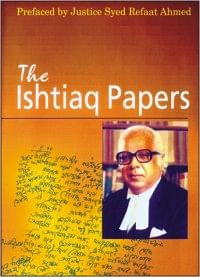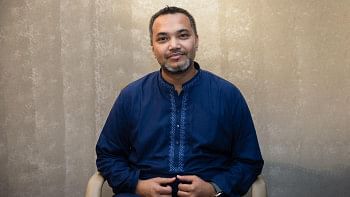The man behind the caretaker details

The Ishtiaq Papers
The University Press Limited
The publication of The Ishtiaq Papers by the University Press Limited on 21 January 2008 on the occasion of the 76th birth anniversary of Barrister Syed Ishtiaq Ahmed is surely a commendable move.
It goes to the credit of the Syed Ishtiaq Ahmed Smriti Parishad that it launched the book at the Bangladesh National Museum. The organisation needs to be congratulated on bringing out this valuable book.
The book has been introduced by the late lawyer's erudite and scholarly wife, National Professor Dr. Sufia Ahmed, and prefaced by his able son, Justice (Dr.) Syed Refaat Ahmed of the Bangladesh Supreme Court. The two writings offer an adequate glimpse of the contents of the book
The book comprises 152 pages and contains two papers authored by Barrister Syed Ishtiaq Ahmed that not only offer an insider's view of the state of affairs that led to the 13th amendment to the constitution regarding the non-party caretaker government but also the working of it. In that sense, the book traces not only the evolution of the caretaker government but also the working of the government in which Ishtiaq was adviser for law and parliamentary affairs.
The system of non-party caretaker government is unique. The two mainstream parties were at loggerheads in the mid-1990s as to whether or not to incorporate the system in the constitution. At core was the issue of whether a party-administered government would be able to hold fair, free and impartial parliamentary elections.
Laying about an idea with a broadsword is the easy bit. It is harder to develop the idea into a concrete proposal. At such a critical juncture, Barrister Ishtiaq, having no political affiliation but prompted by the national interest, moved to invest his time and energy in conceptualising the nuts and bolts of the caretaker government to the satisfaction of all parties.
What made him different was not the extraordinary record of academic and other qualifications he had amassed in his life but his imperturbable conviction that there was a solution to every problem. Most importantly, he had the uncanny knack of finding answers that eluded most others. His thoughts on the caretaker government in the book are a testimony to this attribute in him.
Ishtiaq's thoughts on the caretaker system were published widely in the media at the time. In that sense, what he did was to publicise his views among the public. He believed in transparency of his thoughts and in people's participation in political debate. And he did it with all his sincerity.
Many books are now available on the working of the non-party caretaker government that is installed after an elected government completes its tenure. The purpose and functions of the caretaker government have been incorporated in chapter II A of the constitution. Articles 58B to 58E describe the composition, functions and other duties of the caretaker government.
The Ishtiaq Papers will provide a valuable background to readers and researchers who wish to conduct studies into the working of the caretaker government.
Syed Ishtiaq Ahmed, Bar-at-Law and a former attorney general of Bangladesh, twice adviser for law, in two caretaker governments, was a larger than life figure in legal circles. He became a barrister in 1958 and thereafter was a constitutional expert; and in any crisis of a legal nature he attempted to resolve matters amicably among the parties involved.
The eminent lawyer never compromised with the independence of the judiciary; he wanted to keep the judiciary above any controversy and respected it immensely. He never tolerated any outside interference in the working of the judiciary and was quick to condemn it if it manifested itself. It is believed that he completed the process of the separation of the judiciary from the executive in 2001 but could not implement it because of a request to hold back from the elected government about to enter upon office.
Over the years this reviewer has had the privilege of knowing Barrister Ishtiaq. He hardly ever saw his feathers ruffled. Superiority was something he eschewed, relying on logic and persuasion to achieve his goals. He knew he was endowed with a first rate mind and such was his capacity and so many were his achievements that he had no reason or room for flamboyance or intimidation.
The Ishtiaq Papers is the first instalment of a gift to the nation. It is a book within a book and is able to fill a gap in knowledge and understanding of the functions of the non-party caretaker government system.
The strength of the book comes through its clear reflection of the views of Syed Ishtiaq Ahmed on how the dynamics of the system worked in theory and in reality.
It is believed that Syed Ishtiaq Ahmed has left many unpublished works. One hopes the Smriti Parishad is able to publish gradually all his works for the benefit of readers, researchers, politicians, academics and the younger generation.
Harun ur Rashid, Bar at Law, is former Bangladesh ambassador to the UN in Geneva.

 For all latest news, follow The Daily Star's Google News channel.
For all latest news, follow The Daily Star's Google News channel. 



Comments